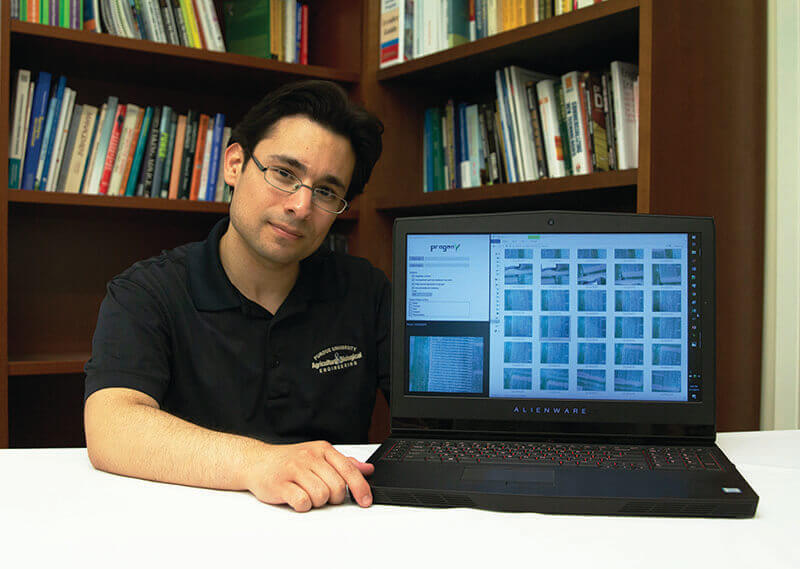May 16, 2019
Agricultural researchers can quickly measure plant growth, health with inexpensive drones, laptops and a software app
 Anthony Hearst is co-founder of Progeny Drone, which has launched a software application that allows plant breeders, agronomists, and others involved in small-plot trials to quickly and easily convert aerial crop photos into real-time plot-level metrics of plant growth and health. That information can help researchers make more data-driven decisions about best practices. (Purdue Research Foundation image/Hope Sale)
Download image
Anthony Hearst is co-founder of Progeny Drone, which has launched a software application that allows plant breeders, agronomists, and others involved in small-plot trials to quickly and easily convert aerial crop photos into real-time plot-level metrics of plant growth and health. That information can help researchers make more data-driven decisions about best practices. (Purdue Research Foundation image/Hope Sale)
Download image
Progeny Drone offers way to save time, money on small-plot trials
WEST LAFAYETTE, Ind. – Agricultural researchers have long used small-plot trials to test a myriad of practices, such as selecting the best seeds, fertilizer and crop-control products, and depending on their eyes and opinions to determine what works best.
The work is costly because it takes a lot of manpower and the results are subjective.
Progeny Drone Inc., a Purdue University-affiliated startup, has launched a software application that allows plant breeders, agronomists, and others involved in small-plot trials to quickly and easily convert aerial crop photos into real-time plot-level metrics of plant growth and health that can help researchers make more data-driven decisions about best practices.
“We can measure plant growth and health faster, at a dramatically lower cost, and more precisely than people can do it by eye,” said Anthony Hearst, a co-founder of Progeny Drone. “The Progeny software app lets people with no programming experience turn raw drone images into plot images and metrics using low-cost drones and laptops.”
Progeny can turnaround these data within 10 minutes, Hearst said.
Hearst, who recently earned his doctoral degree in agricultural and biological engineering at Purdue, launched his startup in 2018. He said he was able to hone his app to meet the needs of potential customers by taking part in the National Science Foundation Innovation Corps program. He received a $50,000 I-Corps grant to survey potential users for a market analysis about the app he was developing.
“I interviewed hundreds of people from plant breeders to weed scientists and others who conduct outdoor small-plot trials and discovered there were a lot of people interested in the product I developed,” he said. “Our app is made by plant breeders, for plant breeders, but it meets the needs of all kinds of people doing outdoor small-plot trials.”
Progeny Drone has licensed the technology through the Purdue Office of Technology Commercialization. DelMar Software Development, based in the Purdue Research Park in West Lafayette, helped Progeny Drone fine-tune the product’s interface for ease of data entry and result tracking. It also helped create a payment mechanism.
“I would not have been able to do this myself,” he said. “DelMar was key to helping us get the app to market. They did a good job of listening to me and getting an understanding of what the technology does and helping me move the app to market.”
Hearst is looking for customers. He said that while he is initially targeting researchers doing small-plot trials, the app could be used eventually by farmers. People interested in the software can learn more here.
Hearst added that the Purdue Foundry, a startup accelerator based in Discovery Park’s Burton D. Morgan Center for Entrepreneurship, was essential in helping Progeny Drone get off the ground. The company also received a $60,000 award from AG-Celerator, a $2 million plant science innovation fund designed to provide critical startup support for Purdue innovators wishing to commercialize Purdue intellectual property.
The technology aligns with Purdue’s Giant Leaps celebration, celebrating the global advancements in sustainability as part of Purdue’s 150th anniversary. It is one of the four themes of the yearlong celebration’s Ideas Festival, designed to showcase Purdue as an intellectual center solving real-world issues.
About DelMar Software Development
DelMar Software Development LLC, celebrating its 15-year anniversary, was established in 2004 in West Lafayette. DelMar builds custom applications for mobile, web, desktops, and cloud servers. With offices in West Lafayette and Indianapolis, DelMar is a software solutions partner for startups and small to large businesses; creating programs and systems that can meet the needs of any product or organization. To learn more, visit https://www.delmarsd.com or contact DelMar at info@delmarsd.com.
About Purdue Office of Technology Commercialization
The Purdue Office of Technology Commercialization operates one of the most comprehensive technology transfer programs among leading research universities in the U.S. Services provided by this office support the economic development initiatives of Purdue University and benefit the university's academic activities. The office is managed by the Purdue Research Foundation, which received the 2016 Innovation and Economic Prosperity Universities Award for Innovation from the Association of Public and Land-grant Universities. For more information about funding and investment opportunities in startups based on a Purdue innovation, contact the Purdue Foundry at foundry@prf.org. For more information on licensing a Purdue innovation, contact the Office of Technology Commercialization at otcip@prf.org and reference (2017-RAIN-67802). The Purdue Research Foundation is a private, nonprofit foundation created to advance the mission of Purdue University.
Writer: Tom Coyne, 765-588-1044, tjcoyne@prf.org
Sources: Anthony Hearst, ahearst@purdue.edu
